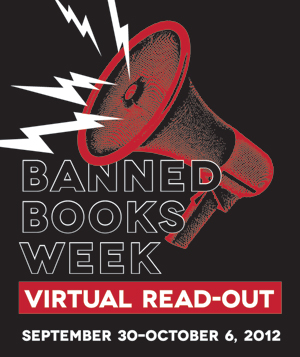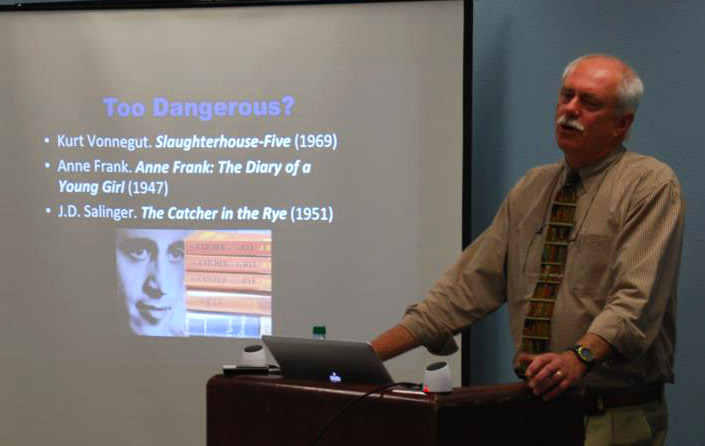Banned books: ‘Are we still talking about this?’ asks First Amendment ‘absolutist’
October 5th, 2012 Posted in OpinionLOGAN—While Barack Obama and Mitt Romney debated their platforms in Denver, another exercise in democracy took place at the Logan Library concerning First Amendment rights and book banning.
 Librarian Joseph Anderson invited Ted Pease, USU’s journalism and communication department head, to share his sentiments on free expression with community members Wednesday as part of the Logan Library’s observance of the 30th National Banned Books Week. His talk was titled, “Banning Books: Boneheaded, Wrong-headed and Thoroughly Un-American.”
Librarian Joseph Anderson invited Ted Pease, USU’s journalism and communication department head, to share his sentiments on free expression with community members Wednesday as part of the Logan Library’s observance of the 30th National Banned Books Week. His talk was titled, “Banning Books: Boneheaded, Wrong-headed and Thoroughly Un-American.”
“Here’s my first question: Do we really need to talk about this?” Pease said. “Seriously, book banning? Didn’t that go out with the rack?”
Anderson, head of the Logan Library’s adult nonfiction and reference services, said Banned Books Week helps raise awareness of continuing struggle to keep books on public and school library shelves.
This year alone, there have been 326 efforts by individuals and communities to ban books in the United States.
“To me the mere concept of banning books brings to mind ancient barbarisms, like burning witches or the Inquisition or shooting the messenger,” Pease said. “As a journalist, I’m pretty sure they don’t shoot the messenger anymore, do they?”
Book banning can be likened to cutting out an individual’s tongue for blaspheming or coming together in an angry mob and brandishing torches and pitchforks, Pease said. Rhetorically, he asked, “But that’s all in the past, isn’t it?”
• Timeline: 30 Years of Liberating Literature.
Bill Moyers, who Pease said is one of his personal heroes, is national chairman of the American Library Association’s Banned Book Week.

Journalism Professor Ted Pease discusses the ‘boneheaded’ continuing practice of book banning in America. Joseph Anderson photo
“For decades, [Moyers] has been a clear voice of reason,” Pease said as he introduced a video clip of Moyers. “Apparently, book banning, as boneheaded and wrongheaded—as un-American—as it is, has not gone out of style. And that came as a surprise to me.”
In the video, Moyers spoke of his first childhood encounter in a library filled with books, and he said how much it excited him to know those books were there for him to read.
“Even in this modern age,” Moyers said, “some folks in communities across America are saying, ‘No, that book isn’t for you,’ and for reasons that have nothing to do with the curriculum of the school or the reader, and everything to do with prejudice.”
One such incident of book banning occurred in Utah earlier this year, in a Davis County school district, when a group of parents of elementary school children came forward to protest the existence of a book that allegedly tells a story about two gay mothers raising a family.
Anderson said initially the individuals protesting the book wanted it out of the school’s library altogether. Instead the title was pulled from library shelves and placed behind counters in four county elementary schools.
“So now a kid has to get a permission slip and bring it to the librarian to take it out, which we think is completely unacceptable,” said Anderson, who is also a vice chair for the Intellectual Freedom Committee for the Utah Library Association. “We have made that clear to them and are trying to work with them. Initially, a statement went out to all the librarians, too, that they needed to go look for stuff that might be controversial and pull that. Luckily, [school officials] received some backlash, and they’ve retracted that.”
Anderson agreed that an act such as asking librarians to search out controversial titles would be similar to the witch hunt—or barbarism—Pease referred to.
At least hundreds of book titles have been placed under scrutiny in recent years, Pease said, including many classics, such as Kurt Vonnegut’s Slaughterhouse Five, Aldous Huxley’s Brave New World, Mark Twain’s Huckleberry Finn and J.D. Salinger’s The Catcher in the Rye.
In his 9th grade English class, Pease said his teacher assigned Vonnegut’s WWII tale the year it came out, 1969
“I had no idea how salacious it was,” Pease said. “Apparently it’s still dangerous. Parents in Republic, MO, said that Slaughterhouse Five was ‘soft pornography’ that glorifies drinking, cursing and premarital sex. Anne Frank—the little girl who hid in the attic from Nazis during World War II—her diary was challenged by parents in Virginia who said it was sexual material and homosexual in theme.”
Pease shared other examples of recent book-banning efforts, which drew chuckles and perplexed reactions from the audience in the library’s Bonneville Room. He then quoted several excerpts from United States Supreme Court justices who have written opinions over the past several decades concerning First Amendment protections—free speech, free press, freedom of religion, freedom to assemble and freedom of petition.
Pease also quoted a long list of prominent individuals, from John Stuart Mill to Noam Chomsky to Potter Stewart. Pease said he is a First Amendment absolutist, which evoked jeers from some audience members.
“There’s a time and a place for everything, of course, but, without free expression, humankind cannot thrive and society cannot function,” Pease said. “Of course, I find some stuff distasteful, and I find some stuff awful, and there’s stuff that I don’t want to see, but I’m not going to make the decision for somebody else to decide what that is.”
Library director Robert Shupe said he and his staff aim to be responsive to the local community and its specific needs, but that has to be done without simply favoring the majority and the expense or exclusion of the minority.
TP
Tags: Banned Books Week, Bill Moyers, censorship, First Amendment, free expression, Logan library, Ted Pease

One Response to “Banned books: ‘Are we still talking about this?’ asks First Amendment ‘absolutist’”
By Linda Bettinger on Oct 16, 2012
I just got around to reading your article about Banned Books Week. As a newly retired Library Media Teacher I was interested in this article.I talked about this with my fifth graders by first having them write a response to the question as to whether it was ever appropriate for someone to ban a book. (Of course we defined and discussed the term first.) 75 to 80% consistently said yes, that it was okay to ban books because they might have bad language or the content might be \"inappropriate\". Then I unveiled books that have been challenged: Harry Potter? Captain Underpants? A Light in the Attic? James and the Giant Peach? Where\’s Waldo? They began to re-think their responses. Who was making these decisions? What did they find to be so offensive? etc. They began to think critically about the issue. What a concept! Like you, I don\’t get why this issue keeps coming up. If fifth graders can get it why can\’t some adults see the problems with this kind of thinking?
On a local political note, there is a lot of critical thinking built into Utah\’s Elementary Library Media curriculum but the \"powers that be\" in the valley (and around the state) are choosing to replace professionally trained Library Teachers with aids. Yet another example of adults not thinking things through.
Thanks for your articles. I enjoy the daily \"afflictions\".